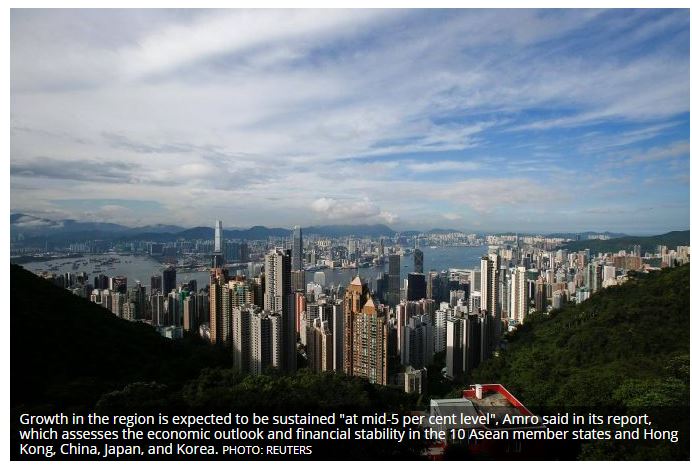Asean growth to remain robust but higher interest rates, trade tensions pose risks: report
GROWTH in Asean is expected to remain robust in the coming years on the back of improving global demand, according to a new report out on Wednesday.
But two key risks could derail this rosy outlook: interest rates rising faster than expected, or an escalation in global trade tensions.
The report was released by the Singapore-based Asean+3 Macroeconomic Research Office (Amro), a unit set up in 2011 following an agreement among regional finance ministries to create an independent body for economic monitoring.
Growth in the region is expected to be sustained “at mid-5 per cent level”, Amro said in its report, which assesses the economic outlook and financial stability in the 10 Asean member states and Hong Kong, China, Japan, and Korea.
The region is set to grow 5.4 per cent this year and 5.2 per cent next year, according to Amro forecasts. This comes on the back of favourable global conditions, underpinned by resilient domestic demand and export growth, with stable inflation.
The report also flagged two key risks to growth. First, if the United States Federal Reserve raises interest rates more quickly than expected, this could lead to a tightening in global financial conditions and cause sharp market reactions if policy actions are not well-communicated.
This could have spillover effects on the region through capital outflows, higher sovereign bond yields, as well as higher borrowing costs and debt refinancing risks.
The second key risk involves the escalation of global trade tensions, particularly between the US and China. The impact of trade tensions would be amplified through the global value chains in the region, the report noted.
“Furthermore, escalation of trade tensions would increase uncertainties and generate spillovers onto the global economy as well as on financial markets.”
The report noted that stronger global growth has helped the region build up buffers against potential external shocks. Regional exchange rates have become more flexible in recent years, and have played a greater role as a shock absorber.
Still, to enhance resilience, the report recommended that policymakers prepare for tighter global financial conditions, especially when it comes to monetary policy.
Fiscal policy could also have a bigger role to play in supporting growth, said the report.
Source: http://www.businesstimes.com.sg/government-economy/asean-growth-to-remain-robust-but-higher-interest-rates-trade-tensions-pose-risks


 Thailand
Thailand




